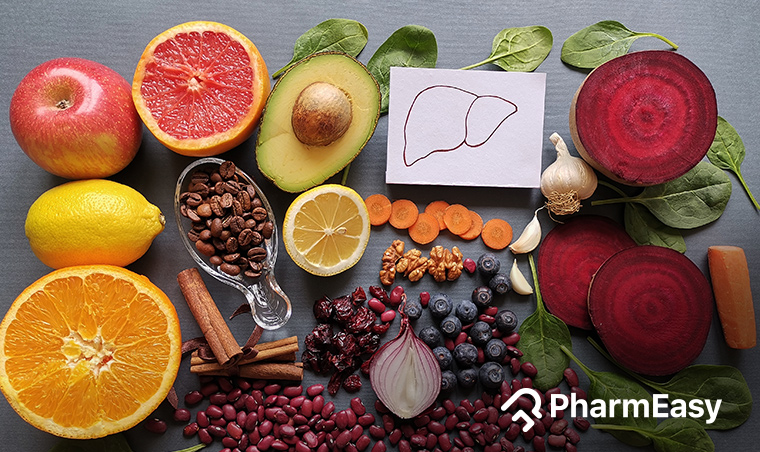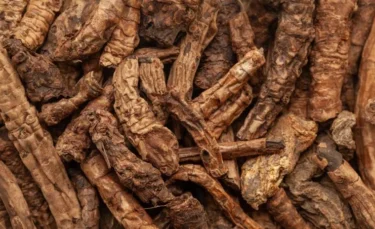Natural Home Remedies for Fatty Liver
By Dr Rajeev Singh +2 more

Get,

to manage your symptom
Get your,


4 Cr+ families
benefitted

OTP sent to 9988776655



You’ve successfully subscribed to receive
doctor-approved tips on
Whatsapp

Get ready to feel your best.

Hi There,
Download the PharmEasy App now!!


Register to Avail the Offer
Send OTPBy continuing, you agree with our Privacy Policy and Terms and Conditions

Hi There,
Sign up on PharmEasy now!!
Trusted by 4 crore+ families

OTP sent to 9988776655



You have unlocked 25% off on medicines




Code: NU25

Comments


Leave your comment here
By Dr Rajeev Singh +2 more
Table of Contents
The liver is the largest organ of the human body. It helps process food and removes toxins from the body. Fatty liver disease is the buildup of excessive fats in the liver cells. Some amount of fat is normal for the liver, but if the fat content is more than 10% of the liver’s weight, you might be suffering from a fatty liver. A fatty liver might not present with any symptoms but can lead to complications like liver damage[1]. However, you can reverse or prevent fatty liver with some lifestyle changes. You can also use some natural home remedies to manage fatty liver.

Did you know?
When the liver cannot process and break down the fats in the body, the fat gets accumulated to cause fatty liver. Overusage of alcohol, malnutrition, and rapid weight loss can also cause fatty liver. The following can make you more prone to fatty liver disease:
However, people who do not have the conditions mentioned above can also develop a fatty liver. A fatty liver can be of two types, non-alcoholic fatty liver disease and alcoholic fatty liver disease.
Fatty liver might not present any symptoms. You may only find out about a fatty liver when you get tests done for other conditions. Fatty liver disease can affect your liver for years without causing any signs or symptoms. However, you might experience these symptoms as the disease gets worse.
The suggested home remedies may help you control the factors that might be contributing to your fatty liver.

Intake of aloe vera gel helps purify the blood and promote liver function. You need to take fresh aloe vera gel to take care of your fatty liver[3]. However, before using any herbal remedy, it is important to consult or notify your healthcare provider. You can also drink aloe vera juice to help with fatty liver.

You can take kutki root powder with warm water to manage the changes in the liver due to fatty liver disease[4]. It is important consult your doctor before using herbal remedies, as certain herbs can damage your liver.

Many doctors recommend losing weight to manage the fatty liver disease[5]. Losing weight may help you reduce the fat content in the liver, swelling and fibrosis (tissue damage). It is important to lose weight safely; you should lose no more than half to one kilogram of weight in a week. You can start with regular exercise, which mayhelp you lose weight and reduce fat.

To manage the alcoholic fatty liver disease, you should try quitting alcohol. Alcoholic fatty liver disease is caused due to over-usage of alcohol. Reducing the use of alcohol might help you manage and reverse fatty liver[6]. If you face difficulty quitting alcohol, you might get help from a therapist or take part in an alcohol recovery program.

Fats are high in calories. Consuming more fats can increase your chances of developing obesity. Obesity is one of the risk factors for fatty liver[7]. It is advised to avoid saturated fats and trans fats and add unsaturated fats to your diet, such as omega 3 fatty acids, to get rid of fatty liver disease. Fish is one of the chief sources of omega 3 fatty acids. You can try fish like herring, salmon and mackerel to get sufficient omega 3 fatty acids. Seeds like flaxseeds and chia seeds also contain plenty of omega 3.

Fruits and vegetables are foods with a low glycemic index. Foods with a low glycemic index are less likely to cause a spike in your blood sugar levels. Eating fruits and vegetables will keep your blood sugar under control and help you manage the fatty liver disease.
You need to avoid consuming sugar in high amounts. Managing blood sugar levels may help to deal with fatty liver disease. Avoid foods with a high glycemic index, for example, white rice, white bread, and potatoes. Consumption of foods and drinks that contain high amounts of sugar, especially fructose, should be avoided. Fructose is a simple sugar used to sweeten soft drinks, sports drinks, and sweetened juices and drinks. You also need to consume less sugar at home. The table sugar, scientifically called sucrose, is rapidly converted to fructose and glucose during digestion.
Involving fibre in your diet has numerous health benefits, like keeping the cholesterol under control, keeping the body weight under control, and stabilising the blood glucose levels. Some important sources of dietary fibre include nuts, seeds, wholegrain foods, oats, barley, lentils, peas, and soy. Keeping the body weight under control may help you manage the fatty liver disease and reduce other complications.
Remain vigilant about monitoring your liver enzyme levels in regular blood test reports. Abnormal levels of liver enzymes can serve as indicators of liver conditions such as fatty liver disease. If you notice any irregularities, consult a doctor, who may also recommend additional imaging tests such as liver ultrasonography or liver fibroscan, if necessary. Early detection can help reverse the condition, if not addressed timely the changes may become irreversible leading to serious complications
Dr. Arpit Verma, MBBS, MD (Pharmacology)
Also Read: Signs You May Have Liver Stress
In most cases of fatty liver, there are no symptoms involved; because of this, it becomes difficult to diagnose this disease. You might not experience any symptoms unless the disease has progressed to liver cirrhosis (a late-stage liver disease in which healthy liver tissue gets replaced with scar tissue). If you notice:
You should immediately contact your health care provider.
Also Read: Simple Home Remedies for Frequent Urination
Fatty liver is the condition in which fat builds up in the liver cells. You might not notice any symptoms associated with fatty liver unless the disease has progressed to a severe condition called cirrhosis. One good news is that you can manage fatty liver by taking caution and losing weight. You can also make use of home remedies like aloe vera or kutki to manage fatty liver disease. Exercising and following a proper diet are some other ways to manage fatty liver.
Fatty liver is difficult to diagnose, but if you notice symptoms like nausea, abdominal pain, swollen legs and abdomen and mental confusion accompanied by weakness, you should contact your doctor immediately.
Also Read: What is Hepatitis A? Causes, Symptoms, and How It Spreads
The liver can repair itself. Therefore, if you can avoid the factors causing your fatty liver, you can reverse fatty liver disease. For this, it is important that you consult your doctor and get proper guidance.
Maintaining your overall health is the best way to prevent fatty liver disease. Do things that keep you healthy, such as maintaining a healthy body weight, exercising regularly, and limiting alcohol consumption.
People with non-alcoholic fatty liver disease can develop complications like liver cirrhosis and liver cancer. Liver cirrhosis can lead to liver failure, which requires a liver transplant. Those suffering from alcoholic fatty liver disease can develop complications like alcoholic hepatitis and cirrhosis.
Herbal remedies to manage fatty liver include aloe vera gel and kutki root. Intake of aloe vera gel enhances liver functions, whereas kutki root powder with warm water can help manage fatty liver. Herbal remedies can also cause damage to the liver.3 Therefore, it is important that you consult your healthcare provider before using these herbal remedies. Your doctor can guide you about the possible treatments for fatty liver.
Being overweight is one of the factors that puts you at high risk of developing fatty liver disease. You need to maintain a healthy body weight to stay healthy.
Liver cirrhosis is the result of severe damage to the liver. Fatty liver disease, if left untreated, can progress to liver cirrhosis. The healthy tissues of the liver are replaced by hard scar tissues. Liver cirrhosis can slow down or completely block liver functions. It can progress to liver cancer or liver failure.
Disclaimer: The information provided here is for educational/awareness purposes only and is not intended to be a substitute for medical treatment by a healthcare professional and should not be relied upon to diagnose or treat any medical condition. The reader should consult a registered medical practitioner to determine the appropriateness of the information and before consuming any medication. PharmEasy does not provide any guarantee or warranty (express or implied) regarding the accuracy, adequacy, completeness, legality, reliability or usefulness of the information; and disclaims any liability arising thereof.
Comments

Leave your comment...

View all comments(1)
You may also like
May I request to know how much aloe vera is recommended daily to help support healing from NAFLD?
Thank you!